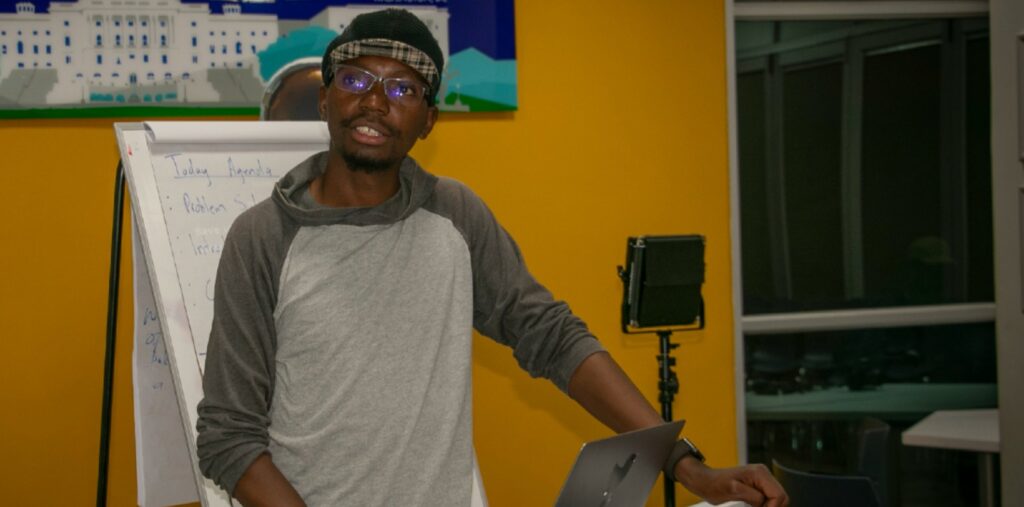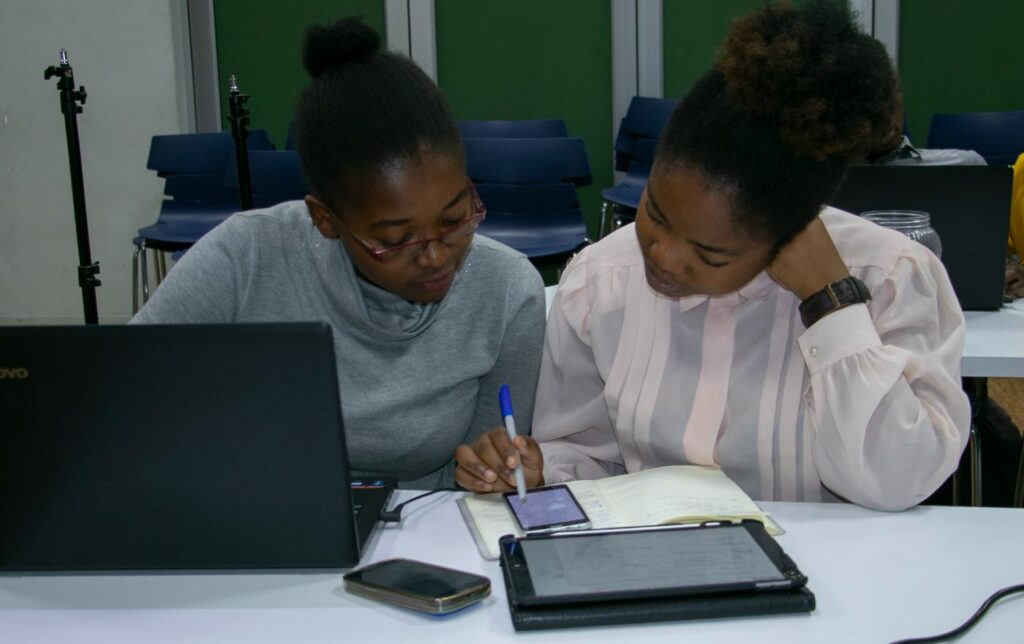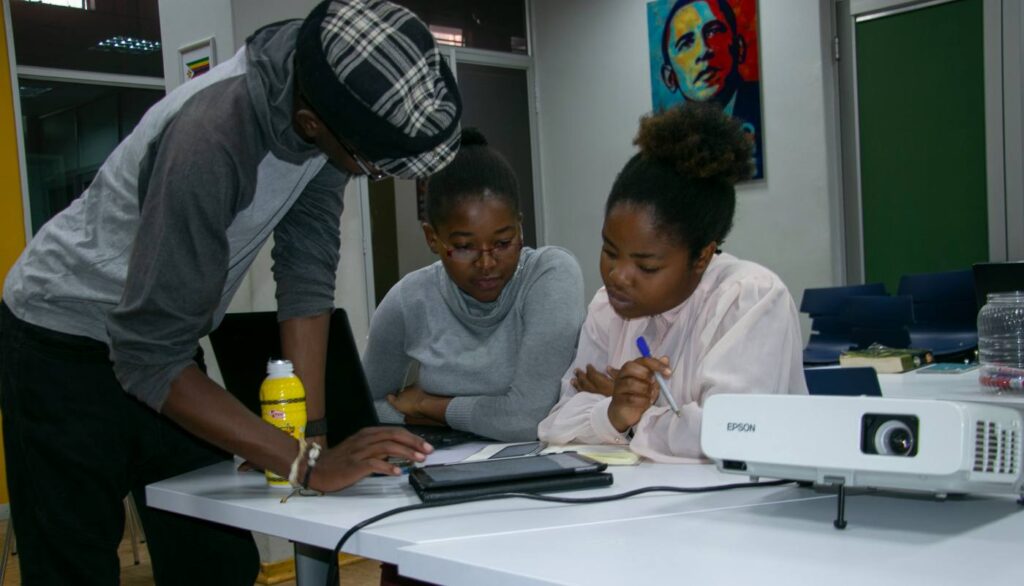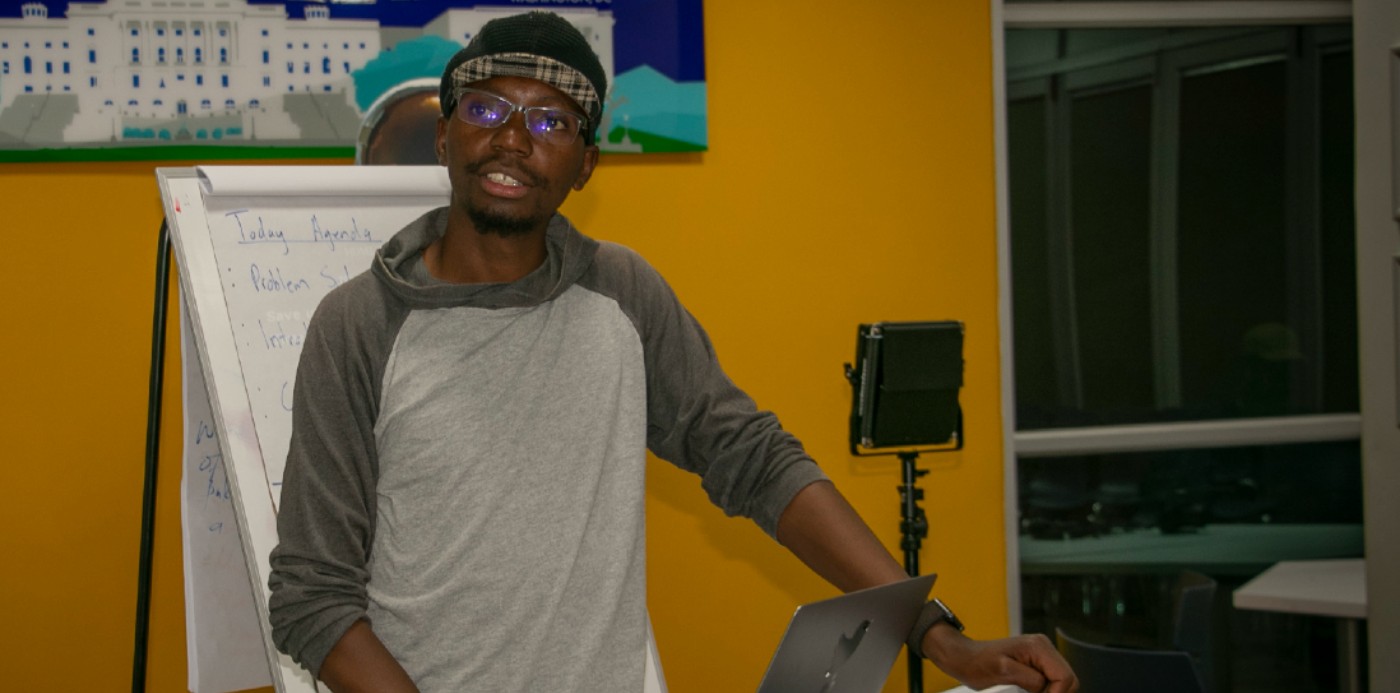
Having been inspired by an introductory coding and computer science class at Berkeley, a young man from Zimbabwe is replicating his experience for talented students in his home country—launching their academic journeys into schools like Northwestern and Stanford.
Like many young Zimbabweans, Eric Khumalo didn’t have a lot of options, even for a curious mind like his. He found a breakthrough moment, however, in a U.S.-sponsored school near his home town of Bulawayo.
A fascination with coding merged with a desire for sharing knowledge, and a background in teaching that would end with Khumalo starting Emzini WeCode, an education program that has grown from teaching locals in Zimbabwe classrooms at the American embassy to hosting online classes for more than 1,000 students.
“I graduated high school in 2018, and within the government there was a shortage of STEM teachers, so I applied for a year and a half,” Eric told GNN. “I taught at three high schools and got accepted into UC Berkeley on a scholarship from the Mastercard Foundation.”
“I wanted to study so many things! I was going to go with chemistry, I was just like ‘okay, I really need to understand how these molecules behave.’”
Like so many successful students, it was the chance encounter with the fabled “good professor” that launched Eric’s computer science journey.
“I was just like asking questions, and then he told me just about his journey, about how when he was a kid he learned to code; he would make games, and for me I just admired the wonderful things he could accomplish with just code,” says Khumalo. “I found it interesting—this power to create, and this power to solve problems, or if you have a solution—scaling it is possible with computer science.”
Afro-tech

Interest in computer science and technology is squarely in the focus of young Africans, not least in those who have taken Eric’s classes at Emzini WeCode, like Nandi Siluma, a teaching assistant at Emzini, who is also a junior at Northwestern University.
“The end goal is to have every child in Zimbabwe, and Africa, knowing how to write, interpret, and manipulate code,” says Siluma.
“I do feel like I am part of a movement to reduce the knowledge gap between the Northern and Southern Hemispheres; that is why I joined Emzini WeCode because I am passionate about sharing learning opportunities with others,” says Proud Npala, another teaching assistant, who took his own experience with Emzini and landed a scholarship at Stanford.
According to Adama Sanneh of the Moleskin Foundation ,who helps run the WikiAfrica Education Program, there’s more information on the city of Paris on Wikipedia, for example, than the entire African continent. Khumalo sees Emizini as a way to close that gap in tech-know-how.
RELATED: Artist’s Joke to His Friends Garners $600,000 for Nigerian Orphanages
“The main problem I wanted to tackle was job creation,” explains Khumalo, whose January classes are now open for enrolment online for 1,000 students.
“I’ve seen, mostly when I was teaching, that my students’ parents or relatives, mostly they all go to South Africa to work, and how they go there is usually… illegal,” he said. “Through Emzini WeCode at least my number one goal is to change the mindset, to tell more young people that they can create things, that they can have ideas that can scale, and to get jobs.”
“I have a vision that local universities here, having young people who are skilled with world-class knowledge, and they get hired to solve some of the problems that we have.”
Despite the growing popularity of his classes, he has kept his them free, or as cheap as possible, covering only the costs of buying the data necessary to stream in the other teachers from their quarters at whichever U.S. university.
“Usually, like two U.S. dollars a month,” says Khumalo. “The group that I usually target most is people who I know are facing challenges in the community. Because I know if I don’t do that… exposing them to this kind of content, how to code, if a young person doesn’t get some of these opportunities, the next thing they think of is ‘okay, I’ll just go to South Africa and work there.”
Owning the house

Emzini means the “house,” in Khumalo’s native language, making Emzini WeCode, “The House of Code.” The name reflects the teaching style, which Eric has modeled to emulate his first experience in computer science at Berkeley, mixed with culturally-relevant aspects.
His focus is broad in scope, avoiding a strict focus on any particular coding language, and opting instead to inspire students to see computer science and coding as a way to solve problems, in whichever career they focus on.
“’This information is good; if I could just take it and find a way of giving it to my people,'” said Eric. “It’s this knowledge I know they really want, but that they don’t have.”
Taking a semester off to return home in 2019, Eric was interested in teaching an introductory coding course at the Education USA program he took before Berkeley. However it wasn’t long before he realized this was not going to be possible.
“I thought people had some foundational knowledge on computer science, but after some time I realized ‘Oh they don’t, they need that course that I took when I was a freshman!’”
LOOK: Solar Microgrids Bring Power to 80,000 in Sierra Leone, Some of Whom Have Gone Without for 60 Years
So he designed a course that was going to appeal to a wide group of people, with a focus on the foundational problem solving/solution-generating abilities of computer science. Banele Ndlovu took Eric’s coding class when he first set it up in Zimbabwe.
“Back home, at that time, coding wasn’t really a thing; especially for females,” Ndlovu told GNN.
“It has actually led me to the interest of tech as a whole, because now I found myself in a great place where I really love the intersection of business and tech,” she said. “I want to pursue product management, and that started from understanding the knowledge of tech which I learned at Eric’s class, so it really does have an impact.”
“He is very good with breaking down complex concepts into simpler, understandable statements,” Nandi adds. “He would use everyday examples that were relatable, sometimes even teach code in IsiNdebele! (our native language) I remember the first time he explained recursion, he used an example of how people pay their bus fares in Zimbabwe starting from the backseat.”
CHECK OUT: Malawi Inventor Lights Up His Whole Village Basically for Free–Starting With a Bicycle and a River
Proud agreed, saying, “I liked the introductory course CS7. It is an amazing course for anyone who wants to get into computer science,” he said. “It’s not too deep nor too shallow… which is why I found it well-structured for an intro course.”
“What Eric is doing is really cool and really humbling as well because being able to create a program like this especially at first directly to students from Zimbabwe… I really love that, I really love how it’s going,” said Banele.
Eric Khumalo feels a great deal of pride seeing the students taking his course moving on to other schools and other careers. He wants to expand the opportunities he gave to them to more people, and he’s currently designing a computer science curriculum for high schools.
“If one of my students can get into Stanford, then ten of my students should get into Stanford,” he said smiling.
SHARE This Brilliant Initiative From Zimbabwe With Others…





















I hope he includes good morals with his coding classes so as to benefit mankind. We’ve already seen what happens when some people learn technology and then code evil things like ransomware, viruses and scams into computers. Technology with good morals can be beneficial for all of us.
All things considered, including that African students are so often overlooked for grants, etc., and have to be exceptional representations of what granting corporations want their images to be, it is a HIGH probability that good morals are a part of his uprbringing as well as his culture.
Getting into Stanford or any other university is no longer a problem. Most colleges and universities have online courses and several offer free college courses online for anyone in the world. Learning from home without the expenses of paying for dorm rooms, cafeteria meals, extra clothing and transportation would be the smartest thing any young person could do today to obtain a university education. https://online.stanford.edu/free-courses
Thank you for that link! Hopefully, in the near future, completing online courses will allow people to be able to be taken seriously for prestigious jobs.